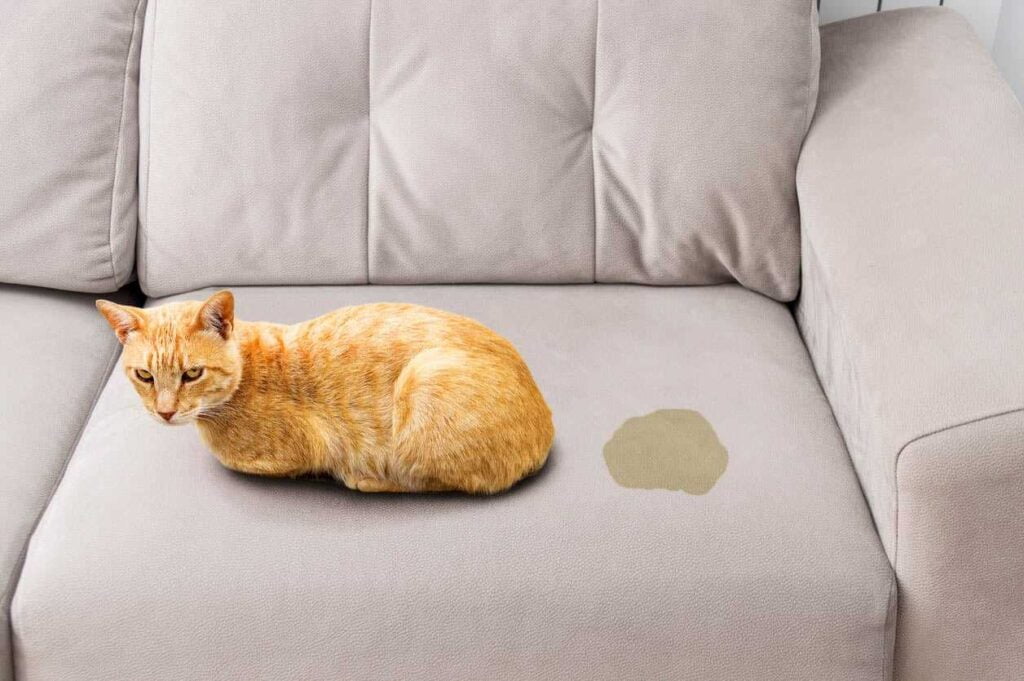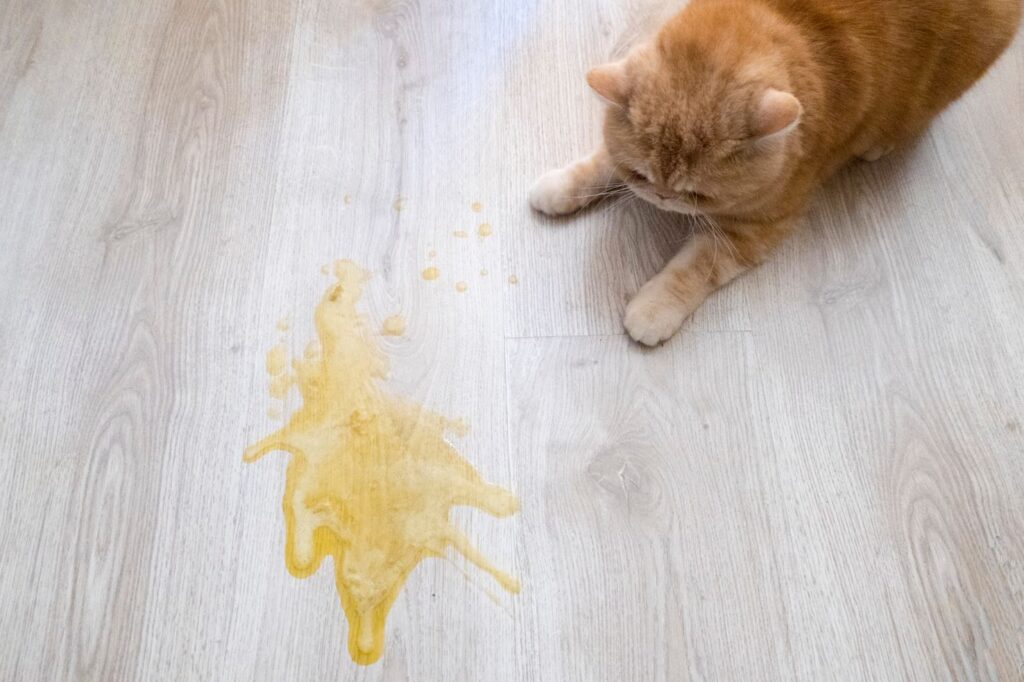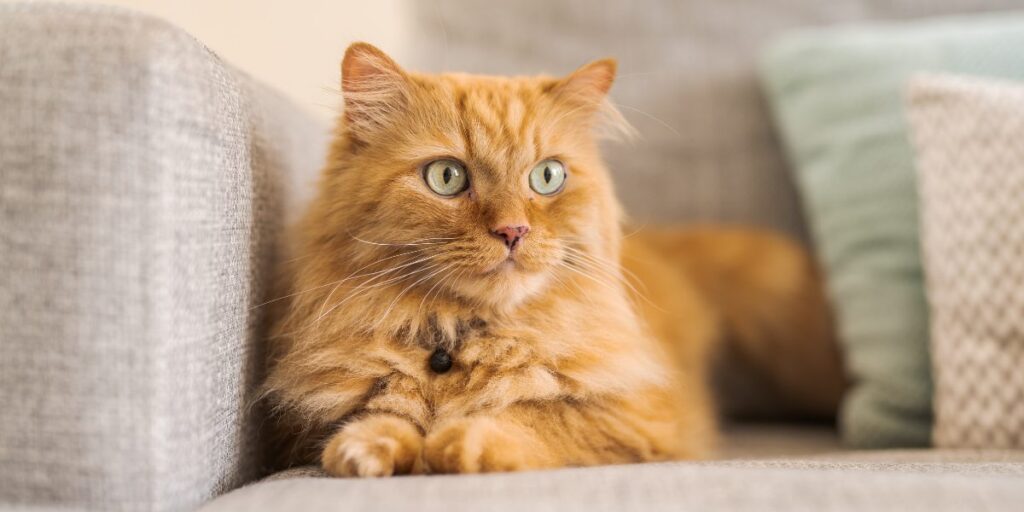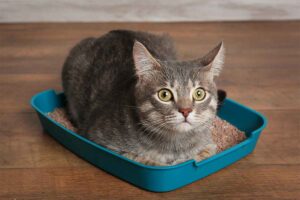Cat Pee Smells Too Strong? Here’s What You Need to Know

As a cat owner, it’s important to keep an eye (and nose) out for any strong smells that may be coming from your cat’s litter box or around your home. Strong cat urine odor can be a sign of an underlying health issue, so it’s important to understand what could be causing it and how to address it.
In this article, we’ll go over the common causes of why your cat pee smells too strong and what you can do to combat it.
Why Your Cat Pee Smells Too Strong

Changes in your cat’s urine scent may occur over time or vary depending on their diet and hydration level. However, if you notice a sudden shift in your cat’s urine smell, it could be a cause for concern.
Here are some indicators that can help you ascertain the cause of the strong-smelling cat pee:
- A strong fishy odor could indicate a urinary tract infection,
- A fruity or sweet smell could suggest feline diabetes.
- Strong ammonia smell could be due to concentrated urine, a symptom of kidney disease.
If your cat’s urination habits have also changed, such as going more frequently or outside the litter box, schedule a visit to the vet to rule out any underlying medical conditions. Additionally, clear, pale yellow urine is normal for cats, and any changes in color or consistency, such as cloudy or dark urine, should be checked by a vet.
Here are some other reasons why your cat pee smells too strong:
Dehydration
One of the most frequent causes of highly odorous cat urine is dehydration. When a cat does not receive sufficient water, their urine becomes more concentrated, leading to a stronger smell. Dehydration can stem from various factors, such as kidney disease, diabetes, or inadequate water intake. It is crucial to address dehydration promptly. It can be hard to get your cat to drink water, however with the right method, you can ensure your cat remains hydrated at all times.
Consider providing multiple water sources throughout your home to encourage drinking. If you suspect your cat may be dehydrated, observe their water intake and behavior. If the issue persists or you notice other concerning symptoms, it is advisable to consult with your veterinarian. They can provide a comprehensive evaluation and offer guidance on managing dehydration and its underlying causes.
Remember, proactive hydration and veterinary care are vital for your cat’s well-being.
Urinary Tract Infections
Another reason why your cat pee smells too strong could be a urinary tract infection (UTI). When cats develop a UTI, it can lead to inflammation and irritation of the bladder, resulting in discomfort and pain. This discomfort often prompts cats to urinate more frequently, and the urine produced may have a stronger odor.
If you suspect that your cat may be experiencing a UTI, it is crucial to seek veterinary care for a proper diagnosis and treatment. A veterinarian will be able to examine your cat and perform tests to confirm the presence of a UTI. Treatment typically involves a course of antibiotics to eliminate the infection and alleviate the associated symptoms.
Additionally, it is important to provide a clean litter box for your cat, as a dirty litter box can contribute to the development or persistence of UTIs. Regularly scooping the litter box and providing fresh litter can help maintain a clean and hygienic environment for your cat.
Diet
Your cat’s diet can also be a reason for why your cat pee smells too strong. Certain foods that are high in protein or magnesium can contribute to stronger-smelling urine. This is because these compounds are broken down during digestion and eliminated through urine. If your cat’s diet includes a high concentration of these substances, it can lead to a more potent odor.
Furthermore, a diet lacking in essential nutrients can affect the overall metabolic process in your cat’s body. This can result in an increased production of waste products, which can lead to stronger-smelling urine. Ensuring that your cat’s diet is well-balanced and provides all the necessary nutrients can help minimize the intensity of their urine odor.
If you suspect that your cat’s diet is playing a role in the strong smell of their urine, it may be worth considering a switch to a high-quality cat food that is specifically formulated to meet their nutritional needs. Consult with your veterinarian for recommendations on appropriate dietary choices that can help mitigate the strong odor of your cat’s urine.
Kidney Disease
Kidney disease is a serious and common condition that can contribute to strong-smelling cat urine. The kidneys play a crucial role in filtering waste products and toxins from the bloodstream, helping to maintain proper hydration and electrolyte balance. When the kidneys are not functioning properly, waste products can accumulate in the urine, leading to a strong and unpleasant odor.
Aside from strong-smelling urine, kidney disease in cats can present with other symptoms such as increased thirst and urination, weight loss, decreased appetite, vomiting, and lethargy. If you suspect that your cat may have kidney disease, it is essential to consult with a veterinarian for a thorough examination and appropriate diagnostic tests.
Treatment for kidney disease aims to manage the condition, slow its progression, and alleviate symptoms. This may involve a homemade diet, fluid therapy, medications to control blood pressure or stimulate kidney function, and other supportive measures. Regular monitoring and follow-up visits with your veterinarian are crucial to assess the effectiveness of the treatment plan and make any necessary adjustments.
Diabetes
Diabetes is a metabolic disorder that can contribute to strong-smelling cat urine. In cats with diabetes, their bodies are unable to properly process glucose, leading to elevated levels of glucose in the bloodstream. When the glucose levels exceed the kidneys’ ability to reabsorb it, the excess glucose is excreted in the urine. This high concentration of glucose in the urine can create a distinct, sweet, and fruity odor that is different from the usual scent of cat urine.
If you suspect that your cat may have diabetes, it is crucial to consult with a veterinarian for an accurate diagnosis and appropriate treatment. The vet will likely perform blood tests to measure glucose levels and assess other markers indicative of diabetes. Treatment for diabetes in cats may involve dietary changes, oral medications, or insulin therapy, depending on the severity and type of diabetes.
Proper management of diabetes is essential to regulate blood sugar levels and prevent complications. This may include regular monitoring of glucose levels, administration of medications as prescribed and maintaining a consistent feeding schedule. Your veterinarian will provide guidance on how to best manage your cat’s diabetes and help you develop a comprehensive treatment plan.
What to Do If Your Cat Pee Smells Too Strong

Dealing with a strong cat urine odor can be a persistent and unpleasant problem. It’s important to find effective solutions to tackle this issue and create a more pleasant environment for both you and your pet.
Here are some practical tips and strategies to combat strong cat urine odor:
Increase Water Consumption
If your cat is dehydrated, increasing their water consumption can help combat strong urine odor.
If your cat is dehydrated, their urine becomes more concentrated, resulting in a stronger smell. To encourage your cat to drink more water, it is essential to provide fresh water in multiple locations throughout your home.
Placing water bowls in different rooms can make it more convenient for your cat to hydrate themselves. Additionally, using a fountain or circulating bowl can attract your cat’s attention and stimulate their interest in drinking. Cats are instinctively drawn to flowing water, and these devices can provide a continuous supply of fresh water, enticing them to drink more.
Another way to increase water intake is by incorporating wet food into their diet. Wet food has a higher moisture content, helping to keep your cat hydrated and diluting their urine. By implementing these strategies, you can promote proper hydration and reduce the concentration of urine, ultimately combating strong urine odor.
Address Health Issues
Addressing any underlying health issues is crucial when combatting strong urine odor in your cat. If you notice a persistent and strong smell in their urine, it’s essential to take your furry companion to the veterinarian for a thorough examination and proper diagnosis. The veterinarian will evaluate your cat’s overall health and may perform diagnostic tests to identify any underlying conditions that could be contributing to the strong odor.
Based on the diagnosis, the veterinarian will recommend appropriate treatment options. This may involve medications to address infections or inflammation, dietary changes to manage specific conditions, or other targeted therapies. Following the veterinarian’s advice and administering any prescribed medications as directed is essential for effective treatment.
Adjust Diet
Adjusting your cat’s diet can be an effective approach to combat strong urine odor. If you suspect that their current diet is contributing to the odor, it may be necessary to make dietary changes. One option is to switch to a lower protein food. High protein diets can lead to the production of more concentrated urine, resulting in a stronger smell. Opting for a cat food with a slightly lower protein content can help dilute the urine and reduce the intensity of the odor.
Another consideration is choosing a diet specifically designed to address urinary tract health. These specialized formulas often contain ingredients that promote a healthy urinary system and help prevent urinary issues that can contribute to strong urine odor. They may have a balanced pH level, controlled mineral content, and added ingredients like cranberry extract to support urinary health.
It’s crucial to consult with a veterinarian before making any dietary changes for your cat. They can provide personalized advice based on your cat’s specific needs and health condition. It’s important to transition to a new diet gradually to avoid any digestive upset. The veterinarian can guide you on the appropriate transition process, ensuring a smooth adjustment for your cat.
Clean the Litter Box
Regularly cleaning your cat’s litter box can help combat strong odors, as can using a high-quality litter. Regular cleaning helps minimize the buildup of waste and bacteria, resulting in a fresher-smelling environment. It is recommended to scoop the litter box at least once or twice a day, removing any clumps or soiled litter. Additionally, completely emptying and cleaning the litter box on a weekly basis can further prevent the accumulation of odors.
Choosing a high-quality litter is equally important. While clay litter is a popular choice, it can generate dust and may not effectively mask odors. Consider exploring alternative options such as litter made from natural materials like corn, wheat, or pine. These types of litter can offer better odor control due to their inherent properties. They often have natural absorbent qualities that help trap odors and reduce their permeation throughout your home.
It’s essential to follow the manufacturer’s instructions for litter usage and maintenance to optimize odor control. Some litter brands may recommend specific techniques or frequency for replacing the litter entirely. By prioritizing cleanliness and selecting an appropriate litter, you can effectively combat strong odors and create a more pleasant environment for both you and your feline companion.
Use a Air Purifier
To effectively combat a particularly pungent odor caused by strong cat urine, considering the use of an air purifier or odor neutralizer designed for pet owners can be beneficial. These specialized products are specifically designed to tackle pet-related odors and help improve the air quality in your home.
Air purifiers equipped with activated carbon or charcoal filters are particularly effective in trapping and neutralizing odors. These filters have the ability to absorb and eliminate odor molecules from the air, resulting in a fresher and cleaner environment. It’s important to choose an air purifier that is specifically designed for pet owners, as these models often have additional features to address pet-related concerns.
When selecting an air purifier, ensure that it is safe for pets and follow the manufacturer’s instructions carefully. Some purifiers have filters that need to be replaced periodically, so be sure to adhere to the recommended maintenance schedule for optimal performance.
By utilizing an air purifier or odor neutralizer, you can help eliminate lingering odors caused by strong cat urine and enjoy a more pleasant and odor-free living space for both you and your pet.
FAQs
Here are some frequently asked questions by pet owners when their cat’s pee smells too strong:
Q. Why does my cat’s urine smell so strong?
Cats have a highly concentrated urine odor due to the presence of urea, uric acid, and ammonia. The smell can intensify if the litter box isn’t cleaned regularly or if there are health issues like urinary tract infections.
Q. How can I reduce the strong odor of cat urine in my home?
Regular cleaning of the litter box is crucial, especially with natural cleaners such as vinegar. Use a quality clumping litter that absorbs odors, and scoop it daily. Consider adding baking soda to the litter to neutralize odors. Also, ensure good ventilation in the litter box area.
Q. Are there specific litter box tips to minimize urine odor?
Choose a larger litter box to give your cat more space and prevent odors from accumulating quickly. Clean the litter box thoroughly with mild soap and water weekly, and replace the litter entirely every 2-3 weeks. Consider using litter box liners for easier cleaning.
Q. When should I be concerned about my cat’s urine odor?
If the urine odor suddenly becomes much stronger than usual or has a foul smell, it could indicate a health problem such as a urinary tract infection, kidney disease, or diabetes. Consult your veterinarian promptly for an evaluation.
Conclusion
Finally, it’s important to remember that strong-smelling cat pee can be more than just an inconvenience – it can also be a health hazard. Ammonia, a chemical found in cat urine, can irritate the lungs and cause respiratory problems over time. This is especially true for those with allergies, asthma, or other respiratory conditions. By taking steps to control odors and address any underlying health issues, you can help keep your cat healthy and your home smelling fresh.
In conclusion, if your cat pee smells too strong, this can be a frustrating and unpleasant problem for any cat owner to deal with. However, with a little bit of effort and some help from your vet, it’s usually possible to get to the root of the issue and find a solution that works for you and your cat. By keeping your cat’s litter box clean and using high-quality litter, investing in odor-neutralizing products, and addressing any underlying health issues, you can help ensure that your home smells fresh and clean – and that your cat stays happy and healthy.


